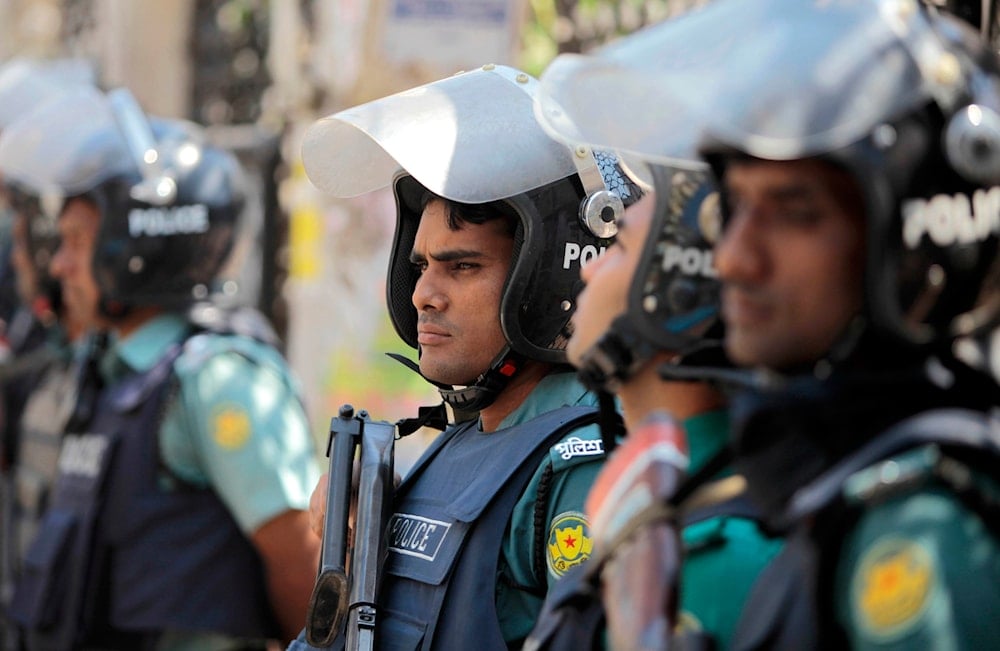Bangladesh tries top officers for disappearances after 2024 protests
15 senior Bangladeshi military officers face trial over enforced disappearances during the 2024 uprising, marking a historic civilian court case.
-

Bangladeshi security personnel stand guard in front of the Baitul Mukarram mosque in Dhaka, Bangladesh, on March 1, 2013. (AP)
In a landmark move, a Bangladeshi court on Wednesday remanded 15 senior military officers into custody on charges of enforced disappearances and atrocities committed during the 2024 uprising that toppled the government.
This marks the first time in Bangladesh’s history that formal charges have been brought for enforced disappearances, and the first instance of such high-ranking military officers being tried in a civilian court.
Among the accused are five generals who allegedly operated a clandestine detention facility during the rule of former Prime Minister Sheikh Hasina. All 15 officers served in either Bangladeshi military intelligence or the Rapid Action Battalion (RAB), a paramilitary force long accused of extrajudicial killings and rights abuses.
Defense lawyer Sarwar Hossain stated that the defendants deny all allegations. “These officers are confident of their innocence and believe they will be exonerated through due judicial process,” he said. Chief prosecutor Tajul Islam confirmed that the accused have cooperated with the judicial proceedings, adding: "They declared their allegiance to the law of the land and their respect for the judicial process."
The United Nations welcomed the trial as a step toward accountability. UN Human Rights Chief Volker Türk described the development as "an important step toward accountability," calling it "a significant moment for victims and their families."
The Bangladeshi army has pledged cooperation, though tensions have remained elevated since the arrest warrants were issued earlier this month. The officers arrived in court under heavy police guard.
Hasina allies also face crimes against humanity charges
In parallel with the military officers’ trial, Bangladesh is prosecuting several former senior figures connected to the now-banned Awami League party, including former Prime Minister Sheikh Hasina. Hasina, 78, fled to India in 2024 and has ignored court summons in her ongoing crimes-against-humanity trial linked to the government’s deadly crackdown during the 2024 uprising.
According to UN estimates, up to 1,400 people were killed in clashes between July and August 2024 as security forces moved to crush anti-government protests. During Hasina’s rule, the RAB was accused of systemic abuses.
Hasina’s trial in absentia is nearing conclusion, with her state-appointed legal team delivering closing arguments. Prosecutors are seeking the death penalty, but the Awami League maintains that Hasina “categorically denies” all charges.
Read next: Bangladesh arrests journalists, writer linked to ousted PM's regime
The trial on the disappearances is being viewed as a turning point in the country’s post-uprising legal landscape. It is also seen as a test of the judiciary's independence and the government’s willingness to pursue accountability at the highest levels of the military and political hierarchy. As the trial unfolds, families of the disappeared and human rights advocates continue to press for broader reforms and justice for victims of the 2024 crackdown.
Earlier this month, the banned Awami League turned to flash protests in the streets of Dhaka as the country braces for the 2026 general elections. Despite being outlawed, loyalists to the former prime minister have heeded Hasina’s calls on social media to "resist", organizing brief rallies that often end in arrests and clashes.

 3 Min Read
3 Min Read







